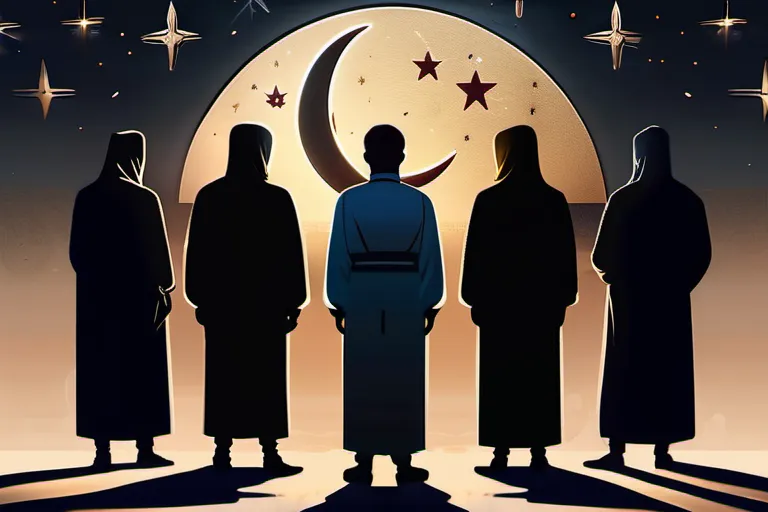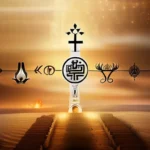Exploring the Significance of Islamic Principles in Modern Times
In today’s diverse and interconnected world, understanding different religions and their beliefs has become increasingly important. This article focuses on the six fundamental beliefs of Islam and discusses why they are crucial in contemporary society.
The Unity of God (Tawhid)
The Unity of God (Tawhid) is like the foundation stone of Islam, much like how a house needs a strong base to stand tall and sturdy. But why is this belief so crucial in today’s society where diversity and pluralism are celebrated? Can’t we live without one universal God?
Consider the world as a vast tapestry woven with countless threads, each representing different beliefs, cultures, and traditions. Tawhid teaches us that even if these threads are diverse, they are all part of the same fabric. It’s like a river flowing towards the ocean; every drop is unique but contributes to the larger body of water.
In a world where religions often clash, Tawhid reminds us of the unity and interconnectedness in humanity. When we believe in one God, it fosters a sense of brotherhood and sisterhood among people. This can be transformative in reducing conflicts and promoting peace, much like how a single thread holds a sweater together.
Moreover, Tawhid encourages us to look beyond our differences and focus on what unites us. It’s about recognizing that we are all children of Almighty God, and thus, every person deserves respect and dignity. This belief can serve as a powerful antidote to the divisions that plague modern society.
So, why is Tawhid important in today’s multicultural society? Because it offers a bridge between diversity and unity, encouraging us to embrace our differences while standing united under one faith. It’s about finding common ground amidst the chaos of our increasingly complex world. Isn’t that something we all can strive for?
Angels
The belief in angels is one of the six fundamental beliefs of Islam, and it holds a profound significance in today’s society where human values often seem to be overshadowed by materialism. Angels are seen as messengers of God who bring divine guidance to humanity, serving as a metaphor for the inner voice that guides us through life’s challenges.
Imagine angels as guardians, watching over each one of us like vigilant sentinels. Just as we might look up at the stars and wonder about their existence, pondering on why they shine so brightly in the night sky, Muslims consider angels a manifestation of God’s constant presence. These divine beings are not just ethereal beings; they embody morality and righteousness, qualities that should guide our actions and decisions.
The role of angels extends beyond their celestial existence. They are described as being close to God, constantly praising Him and serving as a reminder of His omnipresence. This can be likened to the way a lighthouse guides ships through turbulent waters, ensuring they find safe passage. In a world filled with uncertainty, this belief in guiding forces can provide comfort and assurance.
Angels are also seen as intermediaries between God and humanity, delivering messages and prayers. They act like messengers of peace, advocating for compassion, justice, and mercy. Their role is to remind us that every action we take has consequences and that our choices matter in the grand scheme of things.
In today’s fast-paced world, where technology often disconnects us from deeper values, the belief in angels serves as a powerful reminder of the spiritual realm. It encourages us to seek guidance beyond just what is visible or tangible, fostering a sense of purpose and meaning in our lives. By acknowledging the existence of these divine beings, we can find solace in knowing that there are unseen forces working towards our betterment.
So, when you face difficult decisions, remember those angels guiding your path. Their presence offers a beacon of hope, urging us to strive for goodness and righteousness in all that we do. In the tapestry of life, the belief in angels is not just a tradition; it’s a vital thread that connects us to something greater than ourselves.
Prophets
Why is the belief in prophets important in today’s society? Prophets, as messengers from God, serve as vital guides and reminders in our complex world. Think of them like lighthouses navigating through treacherous waters; without their guidance, we might easily lose our way.
What would life be like without a sense of purpose or direction? Prophets provide us with that essential compass, helping to clarify the path and remind us of our duties. They are not merely historical figures but living examples who have navigated through similar challenges we face today. Each prophet was sent with a specific message for their time, yet their teachings remain relevant across generations.
Consider Ibrahim, known in Christianity as Abraham, and his enduring legacy. He is revered for his unwavering faith and willingness to follow God’s commands, even when it meant making the most difficult of choices. His story teaches us about perseverance and trust, qualities that are invaluable in today’s fast-paced society.
Similarly, Prophet Moses led his people out of slavery, teaching them about justice and equality. His struggle against oppression mirrors many contemporary issues we face globally. Moses’ message is one of freedom and the importance of standing up for what is right, even when it seems daunting or unpopular.
Prophets like Muhammad also provide a bridge between ancient wisdom and modern dilemmas. His teachings emphasize compassion, humility, and social justice—principles that are as crucial today as they were over 1400 years ago. They remind us of our interconnectedness and the responsibility we have towards each other.
In a world often clouded by division and misunderstanding, prophets act as beacons of unity and understanding. They teach us about the inherent dignity of every human being, urging us to treat others with respect and kindness. Their messages resonate deeply, offering solace and hope in times of uncertainty.
Imagine if we could live our lives guided by these timeless teachings, how different would society be? The importance of prophets lies not just in their past actions but in the enduring impact they have on shaping our present and future. By embracing their wisdom, we can build a more compassionate and equitable world for all.
The Holy Books
Why is the belief in the holy books central to Islam and how does it shape our understanding of today’s society? The Holy Books, as Muslims believe, are divine revelations meant to guide humanity towards righteousness and truth. Could these ancient texts hold keys to solving modern-day problems?
The Quran, the final revelation from Allah (God), is regarded by Muslims as the ultimate source of guidance. It contains verses that address various aspects of life, from social justice to personal ethics. Imagine if every society had a book like this, guiding them on how to live with fairness and compassion—wouldn’t the world be a different place?
The Five Books of Moses, known as the Torah, also hold significant importance in Islamic tradition. Muslims believe they were revelations from God that later became part of the Jewish religious texts. These books contain commandments and stories that are referenced in the Quran, making them an integral part of Islamic heritage.
In a world where information is abundant but often misleading, these holy books serve as a compass. They remind us of our shared humanity and the responsibilities we have towards each other. Can you imagine a society where everyone referred to these texts for moral guidance? The consequences might be transformative.
Moreover, the belief in these holy books instills in Muslims a sense of accountability. Knowing that their actions are being watched by a higher power can be a powerful motivator for doing good. But this is not just about individual behavior; it’s about creating communities that thrive on trust and respect. Could this be why so many Muslims actively engage in social justice work?
Ultimately, the holy books of Islam are more than just ancient texts—they are living guides that offer solutions to modern challenges. They challenge us to reflect on our actions and strive for a better world. In a time when division and discord seem to dominate much of society, could it be that these books hold the key to unity and progress?
The Day of Judgment
The Day of Judgment: A Metaphor for Accountability
Imagine the Day of Judgment as a grand scale of justice, where every action we take in life is meticulously recorded and weighed. In Islam, this concept serves as more than just a religious doctrine; it’s a powerful lens through which to view personal behavior and societal norms.
Why do we need such an idea? Can’t morality thrive without the threat of divine retribution? The belief in the Day of Judgment encourages individuals to lead virtuous lives, ensuring that every choice has consequences. This belief acts as a silent guide, reminding us of our responsibilities towards one another and the environment.
The metaphorical weight of this day extends beyond individual actions; it also influences communal behavior. Communities become more cohesive when they operate under the principle of accountability. Moral behavior isn’t just about avoiding sin; it’s about fostering an atmosphere where kindness, empathy, and honesty are valued.
How can this belief impact society today? In a world fraught with challenges like climate change and social inequality, the Day of Judgment could serve as a unifying force. It encourages us to make sustainable choices, support marginalized communities, and strive for justice in all our actions. This belief system, when embraced, can lead to a society that is not only more just but also more compassionate.
Thus, understanding and integrating the concept of the Day of Judgment into modern societal discourse can help shape a future where every individual’s actions contribute positively to the greater good. It’s not about fear; it’s about creating a world where everyone has the opportunity to thrive and be accountable for their choices.
Predestination and Free Will
Why do we find the belief in predestination and free will such a compelling topic within Islam? Isn’t it just about fate versus choice, like a tug-of-war between destiny and our own actions? But isn’t there more to it than that?
Imagine life as a grand script written by a divine author. On one hand, predestination suggests that every event in your life has already been decided before you were even born—your path is laid out like the map of an ancient city. Yet, on the other, free will gives you the choice to navigate through this map however you see fit.
How do these two concepts coexist? Isn’t it like walking a tightrope between acknowledging God’s omnipotence and asserting our own agency? This balance is crucial because without free will, we might feel powerless, while too much emphasis on predestination could lead to complacency. Both must intertwine harmoniously for us to understand our roles in the world.
So, why is this belief so important in today’s society? In a world fraught with uncertainty and chaos, how does acknowledging both predestination and free will help us make sense of our lives? It offers a dual perspective that can guide ethical behavior. By accepting predestination, we recognize that everything happens for a reason; by exercising free will, we take responsibility for our actions.
Moreover, this belief has profound implications for social justice. If every individual’s path is predetermined but also influenced by their choices, then society must ensure equal opportunities and fairness in the distribution of resources. Predestination teaches us to trust in a just outcome, while free will demands that we work towards a better world.
In essence, understanding predestination and free will within Islam is like grasping two sides of a coin; one cannot exist without the other. It’s a dynamic interplay that challenges us to be both faithful and proactive, ensuring that our actions today shape a brighter tomorrow for all.
Conclusion
 By appreciating the significance of these six beliefs, we can foster greater mutual respect, promote peace, and build a more inclusive global community.
By appreciating the significance of these six beliefs, we can foster greater mutual respect, promote peace, and build a more inclusive global community.











